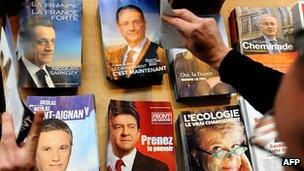France elections: EU at arm's length
- Published
- comments

The final week of campaigning is in full swing ahead of Sunday's vote
Elections take the pulse of a nation. They force leaders and candidates to address the concerns of the people who will hire and fire them. So with the French elections and Europe.
If the polls are right more than 30% of the French electorate will vote on Sunday for candidates who are openly hostile or critical of the EU. The far-right candidate Marine Le Pen wants to take France out of the euro. She believes that the European Union has not protected French jobs.
The far-left candidate Jean-Luc Melenchon appeals to many of the same blue-collar voters as Ms Le Pen. He fundamentally disagrees with the Berlin/Brussels approach to austerity. On the recent pact that enforces budgetary discipline in the eurozone he would put that to a plebiscite.
Mr Melenchon, far from accepting targets to rein in the French budget, would boost spending without looking over his shoulder at Brussels.
The Socialist candidate Francois Hollande - and the favourite to be the next French president - challenges what has become the German orthodoxy. He believes the focus must move away from austerity to growth. He is likely to challenge German leadership in the eurozone crisis. So - realistically or not - he would spend billions on hiring new teachers, on training young people and finding them jobs.
Mr Hollande will also try and renegotiate the pact enforcing budgetary discipline over eurozone budgets, although the expectation is that he might settle for an understanding on growth rather than opening up the whole negotiations again.
At the start of the campaign President Sarkozy was all for having German Chancellor Angela Merkel campaigning for him. You do not hear that anymore. The French president - on the stump - is now distancing himself from Berlin.
On Sunday he broke an agreement with Chancellor Merkel not to question the role of the European Central Bank, external. He and Chancellor Merkel had disagreed about it in the past. The French want the bank to act more aggressively, to relieve pressure on troubled governments and to pay more attention to growth.
The Germans will not countenance anything that in their view compromises the independence of the bank. President Sarkozy now favours changing the rules set out in the Treaty of Maastricht, to give the bank more flexibility. The Germans dismiss that as electioneering, but the president believes "there is a major problem for the future of Europe" in the way the bank operates. Under the treaty's no bailout clause the ECB is not supposed to buy debt directly from eurozone states.
Even though President Sarkozy accepts France must bring down its debts - and lambasts his main opponent for planning a festival of spending - he too has become an open doubter about austerity. "If Europe chooses deflation," he said at the weekend, "she will disappear".
On the campaign trail President Sarkozy has said he will freeze contributions to the EU budget; he will suspend membership of the Schengen agreement, which guarantees free movement of people in the EU, unless Europe's borders are better defended against immigration; and he openly favours a "Buy European Act", which would be strongly opposed by the European Commission.
In recent months Chancellor Merkel has been speaking of the need for "more Europe". She has taken to dropping into speeches the prospect of a political union. That would be a massive step, but none of this is mentioned at election time in France. There are no votes in a more closely united Europe.
The votes lie - and all candidates seem to recognise this - in France having greater control of its own affairs. As Francois Hollande said, "we are a great nation, a great country, whose choices are not made by the heads of state or governments of countries that are friendly but external to our democracy". That is the pitch at election time in France.